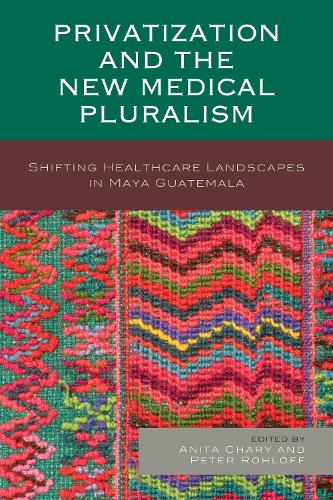
Privatization and the New Medical Pluralism: Shifting Healthcare Landscapes in Maya Guatemala
(Hardback)
Publishing Details
Privatization and the New Medical Pluralism: Shifting Healthcare Landscapes in Maya Guatemala
By (Author) Anita Chary
Edited by Peter Rohloff
Contributions by Peter Benson
Contributions by Anita Chary
Contributions by Alejandra Colom
Contributions by Shom N. Dasgupta-Tsikinas
Contributions by David Flood
Contributions by Rachel Hall-Clifford
Contributions by Nora King
Contributions by Jonathan Maupin
Bloomsbury Publishing PLC
Lexington Books
17th September 2015
United States
Classifications
Professional and Scholarly
Non Fiction
Indigenous peoples / Indigeneity
Social and cultural anthropology
362.1089097281
Physical Properties
Hardback
226
Width 160mm, Height 234mm, Spine 22mm
472g
Description
Privatization and the New Medical Pluralism is the first collection of its kind to explore the contemporary terrain of healthcare in Guatemala through reflective ethnography. This volume offers a nuanced portrait of the effects of healthcare privatization for indigenous Maya people, who have historically endured numerous disparities in health and healthcare access. The collection provides an updated understanding of medical pluralism, which concerns not only the tensions and exchanges between ethnomedicine and biomedicine that have historically shaped Maya peoples experiences of health, but also the multiple competing biomedical institutions that have emerged in a highly privatized, market-driven environment of care. The contributors examine the macro-structural and micro-level implications of the proliferation of non-governmental organizations, private fee-for-service clinics, and new pharmaceuticals against the backdrop of a deteriorating public health system. In this environment, health seekers encounter new challenges and opportunities, relationships between the public, private, and civil sectors transform, and new forms of inequality in access to healthcare abound. This volume connects these themes to critical studies of global and public health, exposing the strictures and apertures of healthcare privatization for marginalized populations in Guatemala.
Reviews
The long-term effects of neoliberal agendas to privatize global health are still being revealed, particularly in developing countries still recovering from devastating policies of structural adjustment. This collection offers stunning and often harrowing ethnographic details about these effects in Guatemala. Without romanticizing the nation's past or glossing over its persistent national challenges, the authors here reveal how the blending of public, private, humanitarian and for-profit medical resources today far too often fails patients, marginalizes indigenous healers, and secures profits for the wrong reasons. This should be a model for studies of medical pluralism for the 21st Century -- Vincanne Adams, University of California, San Francisco
This volume offers a nuanced, yet amazingly lucid and hard-hitting critique of the NGOization of health care, even in contexts like Guatemala where the postcolonial state offered little before implantation of neoliberal policies. This Republic of NGOs offers a pluralism that nonetheless displaces traditional, indigenous health systems. A must read for scholars and students of medical anthropology, NGOs, and contemporary Central America. -- Mark Schuller, Northern Illinois University
Author Bio
Anita Chary is an MD/PhD candidate in anthropology at Washington University in St. Louis. Peter Rohloff is an instructor in medicine at Harvard University, an internist at Brigham and Womens Hospital, and a pediatrician at Childrens Hospital Boston.
